- Page 1 and 2: Assessing Quality Dimensions and El
- Page 3 and 4: DEDICATION To my husband, Mark B. H
- Page 5 and 6: TABLE OF CONTENTS Page List of Tabl
- Page 7 and 8: Frequency of Quality Elements Used
- Page 9 and 10: 4.19. Regression Analysis for QE Co
- Page 11 and 12: ABSTRACT ASSESSING QUALITY DIMENSIO
- Page 13 and 14: determine which dimensions contribu
- Page 15 and 16: of the institution, and even to pro
- Page 17 and 18: Online Learning in Higher Education
- Page 19 and 20: 6. Internet and/or Web-based techno
- Page 21 and 22: learning is realized through carefu
- Page 23 and 24: Quality Defining quality of learnin
- Page 25 and 26: of online discussion, quality and t
- Page 27 and 28: increasing concern. Students are no
- Page 29 and 30: Therefore, this study is framed by
- Page 31: Significance of the Study The study
- Page 35 and 36: was available in an electronic form
- Page 37 and 38: when learners and instructor are se
- Page 39 and 40: 2. Review of Literature Introductio
- Page 41 and 42: Trends Online Learning in Higher Ed
- Page 43 and 44: and well-known (Schiffman et al., 2
- Page 45 and 46: advantages of online instruction: (
- Page 47 and 48: esearch indicates that teacher-cent
- Page 49 and 50: terms frequently used in the litera
- Page 51 and 52: 1. Globalization and learning as a
- Page 53 and 54: Duguid, 1989; Lave & Wenger, 1991;
- Page 55 and 56: Commercial CMSs were developed to m
- Page 57 and 58: online environment which allowed th
- Page 59 and 60: definitive research regarding the p
- Page 61 and 62: through a “strong content validat
- Page 63 and 64: Cleveland-Innes, 2005; Rovai, 2003;
- Page 65 and 66: face to face courses. The researche
- Page 67 and 68: environments, online instructors mu
- Page 69 and 70: Students who received personalized
- Page 71 and 72: Runnels (2004) developed a rubric t
- Page 73 and 74: Learner-learner interactions also s
- Page 75 and 76: participate in order to meet course
- Page 77 and 78: interaction with content is possibl
- Page 79 and 80: (2000) found that requiring student
- Page 81 and 82: Learner-Interface Elements of Desig
- Page 83 and 84:
identifies strategies grounded in c
- Page 85 and 86:
1. Authentic activities have real-w
- Page 87 and 88:
elation to readings and to structur
- Page 89 and 90:
Workman and Stenard (as cited by Ro
- Page 91 and 92:
123). Some learning groups choose t
- Page 93 and 94:
Encouraging students to share their
- Page 95 and 96:
applied disciplines preferred onlin
- Page 97 and 98:
for the best deal” (Howell, et al
- Page 99 and 100:
frustrated by inconsistent course d
- Page 101 and 102:
grounded theory research. Data coll
- Page 103 and 104:
3. Methodology Research Questions T
- Page 105 and 106:
5. Which quality dimensions contrib
- Page 107 and 108:
comparable to at least two dozen un
- Page 109 and 110:
Institute for Advanced Study. The I
- Page 111 and 112:
courses and hybrid courses. The gen
- Page 113 and 114:
Table 3.1 Tenure Status of Instruct
- Page 115 and 116:
Table 3.3 Number of Courses Publish
- Page 117 and 118:
Instrumentation Quilter and Weber (
- Page 119 and 120:
Quality elements were identified an
- Page 121 and 122:
The response options for students
- Page 123 and 124:
Inventory. Although the University
- Page 125 and 126:
A total of 187 forms were completed
- Page 127 and 128:
Table 3.9 CHSS FOCI Report Rank N W
- Page 129 and 130:
Table 3.13 CVPA FOCI Report Rank N
- Page 131 and 132:
Table 3.16 Summary of Online Learni
- Page 133 and 134:
The researcher provided contact inf
- Page 135 and 136:
use when differences between all gr
- Page 137 and 138:
Finally, Web-only courses were not
- Page 139 and 140:
4. Results Introduction Over the la
- Page 141 and 142:
Course identification number was us
- Page 143 and 144:
ated highly by the majority of stud
- Page 145 and 146:
Table 4.2 Means of Overall Quality
- Page 147 and 148:
online courses. Interestingly, “o
- Page 149 and 150:
The frequency of learner-learner qu
- Page 151 and 152:
Quality elements of learner-content
- Page 153 and 154:
The data collected on the frequency
- Page 155 and 156:
The data on frequency of use of lea
- Page 157 and 158:
Elements of quality for social pres
- Page 159 and 160:
RQ 3: Is there a difference in univ
- Page 161 and 162:
etween full time and part time stud
- Page 163 and 164:
Table 4.11 ANOVA: Overall Dimension
- Page 165 and 166:
The third hypothesis of RQ4 stated,
- Page 167 and 168:
Table 4.14 Regression Analysis for
- Page 169 and 170:
Table 4.15 Regression Analysis for
- Page 171 and 172:
Table 4.16 Regression Analysis for
- Page 173 and 174:
Table 4.17 Regression Analysis for
- Page 175 and 176:
Table 4.18 Regression Analysis for
- Page 177 and 178:
Table 4.19 Regression Analysis for
- Page 179 and 180:
166 Table 4.20 Summary of Quality E
- Page 181 and 182:
each dimensions were used in online
- Page 183 and 184:
5. Discussion and Recommendations S
- Page 185 and 186:
commonalities and distinctions were
- Page 187 and 188:
Enrollment in Online Courses The ma
- Page 189 and 190:
such as online quizzes and tests an
- Page 191 and 192:
technologies, and instructional str
- Page 193 and 194:
Based on the findings, a variety of
- Page 195 and 196:
Other researchers have addressed th
- Page 197 and 198:
the analyses conducted in this stud
- Page 199 and 200:
Recommendations As a result of the
- Page 201 and 202:
Finally, separating Web-only from h
- Page 203 and 204:
Appendix A SCHEV peer institutions
- Page 205 and 206:
Instructor-Learner Interactions (IL
- Page 207 and 208:
11. Conversational tone from the in
- Page 209 and 210:
27. Relevant and meaningful online
- Page 211 and 212:
41. Freedom to explore and inquire
- Page 213 and 214:
57. Working hyperlinks Dimension Ob
- Page 215 and 216:
Appendix D 202
- Page 217 and 218:
204
- Page 219 and 220:
206
- Page 221 and 222:
208
- Page 223 and 224:
210
- Page 225 and 226:
212
- Page 227 and 228:
Appendix E 214
- Page 229 and 230:
Appendix F Email to faculty request
- Page 231 and 232:
Dear George Mason student, Appendix
- Page 233 and 234:
REFERENCES 220
- Page 235 and 236:
American Distance Education Consort
- Page 237 and 238:
Campbell, T. (2006). Evolution and
- Page 239 and 240:
Dawson, S. (2006). A study of the r
- Page 241 and 242:
Georgina, D. A., & Olson, M. R. (20
- Page 243 and 244:
Hughes, S., Wickersham, L., Ryan-Jo
- Page 245 and 246:
Larreamendy-Joerns, J., & Leinhardt
- Page 247 and 248:
McPherson, M., & Nunes, M. B. (2004
- Page 249 and 250:
Perold, J. J., & Maree, D. F. (2003
- Page 251 and 252:
Russo, T. C., & Campbell, S. W. (20
- Page 253 and 254:
Stewart, I., Hong, E.,& Strudler, N
- Page 255 and 256:
Wagner, E. D. (1994). In support of
- Page 257:
CURRICULUM VITAE Dawn M. Hathaway g



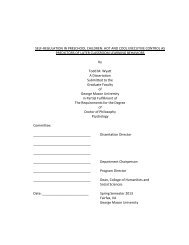
![[Sample B: Approval/Signature Sheet] - George Mason University](https://img.yumpu.com/21978828/1/190x245/sample-b-approval-signature-sheet-george-mason-university.jpg?quality=85)
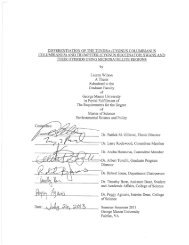
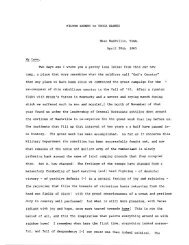
![[Sample B: Approval/Signature Sheet] - George Mason University](https://img.yumpu.com/18694905/1/190x245/sample-b-approval-signature-sheet-george-mason-university.jpg?quality=85)
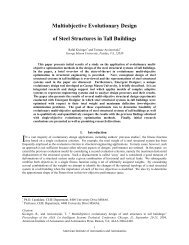

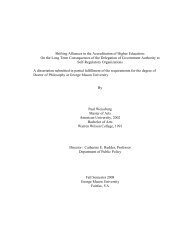
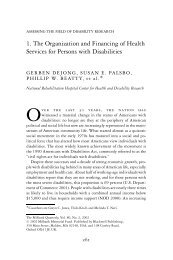
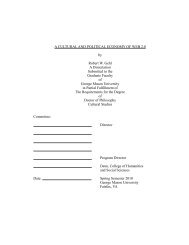
![[Sample B: Approval/Signature Sheet] - George Mason University](https://img.yumpu.com/18694552/1/189x260/sample-b-approval-signature-sheet-george-mason-university.jpg?quality=85)
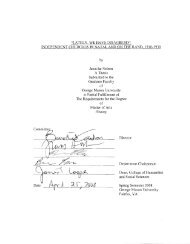
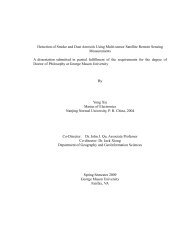
![[Sample B: Approval/Signature Sheet] - George Mason University](https://img.yumpu.com/18694474/1/190x245/sample-b-approval-signature-sheet-george-mason-university.jpg?quality=85)